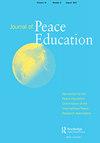And then your soul is gone: moral injury and U.S. war-culture
IF 1.3
Q3 EDUCATION & EDUCATIONAL RESEARCH
引用次数: 1
Abstract
simultaneously mediated by, interacted with, and engaged in re-figurations of resilience, protection, enlistment, and unequal relations of power, in a number of contexts, namely Kashmir (India), Ukraine, Bastar (India), and the United States. The part is finally concluded with Chapter 12 focusing on the procedures of child discipline and caregiver rituals. The volume’s core strength lies upon the eclectic positionality of the contributors. Seventeen authors from a wide range of geographies have contributed to this 245-page volume. More interestingly, one of the chapters (Chapter 3) is coauthored by an ex-child soldier in the civic war of Bosnia and Herzegovina. The contributors of the book have successfully provided new insights within the studies of children in peace and conflict settings, as well as the pedagogical dimensions of it. As reflected from the authors’ origins, the coverage of the book includes countries with conflict and war track records, such as those within the European and Asia Pacific territories. However, the book may have missed one (or two) thing(s): the conclusion (and the implications). While we, the readers, expect this conclusion will be presented in the last chapter (Chapter 12), as admitted by the editor himself, the chapter is rather ‘outwardly distinct from many of the contributions to this volume’ (16). The book may have been better if it provides more accounts and voices of the children from both peace and conflict settings from various contexts for comparison purposes – while the book provides only a chapter on this (Chapter 3). Despite this shortcoming, Childhoods in Peace and Conflict should be regarded as an important and novel resource in the studies about the intersections of children, conflict, and peace. The volume makes a significant contribution to the area of peace and conflict studies, including peace pedagogy.然后你的灵魂消失了:道德伤害和美国战争文化
在克什米尔(印度)、乌克兰、巴斯塔(印度)和美国等多个国家,同时由其调解、互动并参与恢复力、保护、入伍和不平等权力关系的重建。本部分最后以第12章结束,重点介绍了儿童管教和看护仪式的程序。该卷的核心优势在于撰稿人不拘一格的立场。来自不同地区的17位作者为这本245页的书做出了贡献。更有趣的是,其中一章(第3章)是由波斯尼亚和黑塞哥维那内战中的一名前儿童兵合著的。该书的撰稿人成功地为和平与冲突环境中的儿童研究及其教学层面提供了新的见解。从作者的出身可以看出,该书的涵盖范围包括有冲突和战争记录的国家,如欧洲和亚太地区的国家。然而,这本书可能遗漏了一(或两)件事:结论(和含义)。虽然我们读者期待这一结论将在最后一章(第12章)中提出,正如编辑本人所承认的那样,但这一章“与本卷的许多贡献在表面上截然不同”(16)。如果这本书提供了更多关于和平和冲突背景下儿童的描述和声音,以供比较,那么它可能会更好——而这本书只提供了一章(第3章)。尽管存在这一缺陷,但在儿童、冲突与和平的交叉研究中,《和平与冲突中的儿童》应被视为一个重要而新颖的资源。该卷对和平与冲突研究领域,包括和平教育学作出了重大贡献。
本文章由计算机程序翻译,如有差异,请以英文原文为准。
求助全文
约1分钟内获得全文
求助全文

 求助内容:
求助内容: 应助结果提醒方式:
应助结果提醒方式:


